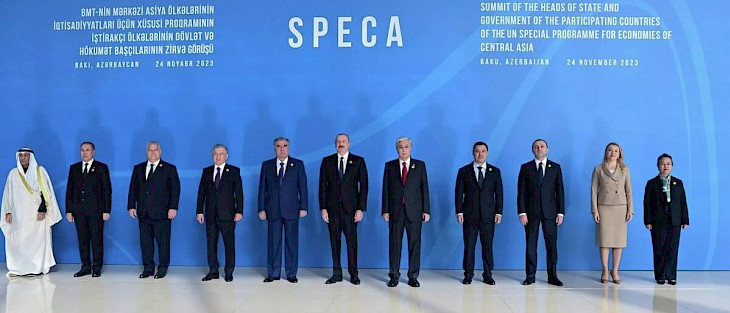The first summit of the heads of states and governments of countries participating in the United Nations Special Program for the Economies of Central Asia (SPECA) marks an important stage for cooperation between the countries, said the Deputy Chairman of the Cabinet of Ministers of Turkmenistan, Khodzhamyrat Geldymyradov, Orient.tm reports.
"Interest in Central Asia is growing every year. Our region is developing rapidly. The presence of natural resources and a favorable geographical location makes it attractive for significant investments," he said.
Geldymyradov also noted that Turkmenistan has intensified trade cooperation with program countries in recent years.
As reported by Report.az, President of Azerbaijan Ilham Aliyev, speaking at the summit, stated, "We welcome the resolution adopted by the UN General Assembly in connection with the 25th anniversary of SPECA. The SPECA Target Fund was established under the auspices of the UN. Azerbaijan will allocate $3.5 million to the SPECA Target Fund."
Prime Minister of Hungary Viktor Orban emphasized the significance of initiatives like the United Nations Special Program for the Economies of Central Asian countries in bridging the gap between the West and the East. He stressed the importance of cooperation between countries on various platforms. "We are building fraternal relations with Azerbaijan and the countries of Central Asia," added Orban.
President of Tajikistan Emomali Rahmon stated that the time has come for the implementation of important and productive projects within SPECA. He called for a more effective use of SPECA for the development of regional integration, transport infrastructure in SPECA countries, and their further integration into international transport corridors. The Tajik leader also proposed the establishment of an Artificial Intelligence Center in Tajikistan for the collaboration of SPECA countries.
President of Uzbekistan Shavkat Mirziyoyev, speaking at the summit, expressed confidence in the possibility of increasing trade turnover between participating countries. He proposed the creation of a working group to achieve food security for participating countries.
President Kassym-Jomart Tokayev emphasized that SPECA countries are capable of providing each other with various goods at competitive prices, reducing imports from other countries. The creation of "green" corridors and the removal of various barriers will give a significant boost to our trade cooperation, including in industries such as construction, chemical, and food industries, he said. Tokayev also called for the development of a common action plan to improve the condition of the Caspian Sea.
Kyrgyzstan intends to use the Trans-Caspian International Transport Corridor for road and rail freight transportation from Kyrgyzstan and China to European countries, Georgia, Azerbaijan, said President Sadyr Japarov. He emphasized the importance of the construction project of the China-Kyrgyzstan-Uzbekistan railway and the ongoing work on organizing and implementing cargo transportation routes from Kyrgyzstan to Uzbekistan, Turkmenistan, Iran, Turkey, and further to European countries, as well as from Kyrgyzstan to Uzbekistan, Turkmenistan, Iran, and further to Saudi Arabia.
Prime Minister of Georgia Irakli Garibashvili noted during his speech that Georgia is interested in consolidating partnership with Azerbaijan and the Central Asian region.
The states of the Persian Gulf are ready to expand cooperation with the countries of Central Asia, said the Secretary-General of the Gulf Cooperation Council, Jasim Muhammad al-Budaiwi, in Baku. According to him, global regional challenges emphasize the importance of taking collective multilateral actions, and in this sense, the activities of SPECA are very important.
Executive Secretary of the United Nations Economic Commission for Europe (UNECE) Tatiana Molchan highlighted the unique transit potential of the SPECA region. "Cooperation between SPECA countries creates new opportunities for economic development in the region. New supply chains are being formed. The SPECA region demonstrates fairly stable economic growth dynamics," she said.
It is necessary to expand the digital capabilities of the United Nations Special Program for the Economies of Central Asian Countries (SPECA) region, according to the Executive Secretary of the United Nations Economic and Social Commission for Asia and the Pacific (ESCAP) Armida Salsiah Alisjahbana. According to her, the development of renewable energy sources (RES) and the economies of the region will create opportunities to increase competitiveness.
The summit of participating states in the United Nations Special Program for the Economies of Central Asian Countries (SPECA) concluded with the adoption of the Baku Declaration.
CentralasianLIGHT.org
November 24, 2023

